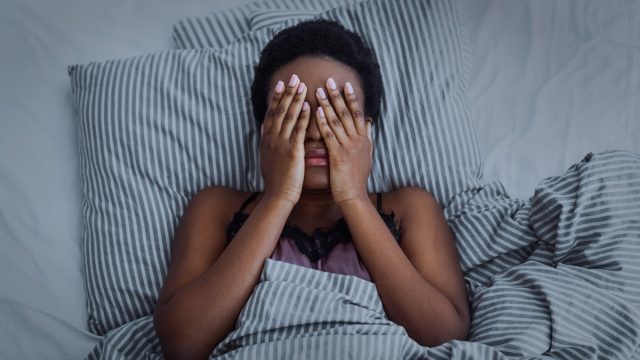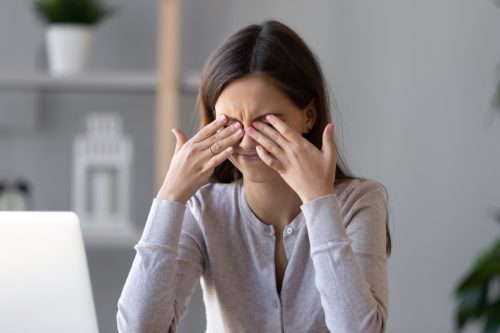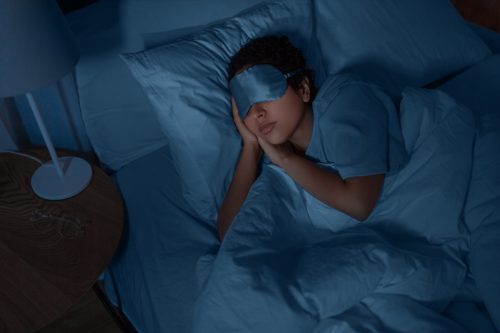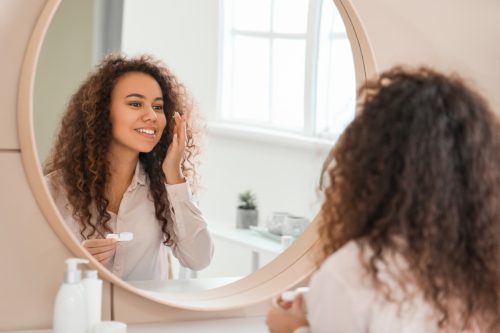What Happens If You Fall Asleep With Contacts In, Doctors Say
It's easy to do—but you really shouldn't. Here's why.

Getting plenty of good sleep is one of the best things we can do for our bodies. But if you don't practice good sleep hygiene, that rest may not be as restorative as you hope. Specifically, failing to take your contacts out before you fall asleep can be damaging to your eyes—something actor Tori Spelling recently learned after developing an eye ulcer as a result of sleeping in her contacts.
While Spelling confessed that she regularly wore her contacts for up to 20 days, doctors discourage any amount of shut-eye with contact lenses in. "In general, sleeping in contact lenses is inadvisable," says James Kelly, MD, an ophthalmologist at the Kelly Vision Center in New York City.
Read on to find out what he says can happen if you conk out with your contacts in, and you might just reconsider your bedtime routine if you're ever tempted to skip the taking-contacts-out step.
READ THIS NEXT: If You See Eye Floaters, It Could Be a Sign of This Chronic Condition.
Your eyes need to "breathe."

When you think about breathing, you probably think of your lungs, or your nose, or both. But other parts of your body need oxygen, too. "It's important to give the eyes a break and let the cornea breathe," ophthalmologist Allison Babiuch, MD, told the Cleveland Clinic.
The cornea, which Babiuch explained is "the front surface of your eye," is essential to your eyesight. Besides protecting your eye, it plays a key role in helping you focus, experts say. Disease, injury, and infection can all damage your cornea—and you can add sleeping in contacts to that list, as well.
"The eyes do not receive proper oxygenation and nutrient supply with extended contact lens usage," Kelly tells Best Life. In other words, they can't breathe.
READ THIS NEXT:If You Notice This With Your Eyes, Get Your Thyroid Checked, Doctors Say.
Sleeping in contacts can irritate your eyes.

So what happens if you doze off without removing your contact lenses? Kelly says that even a short nap with contacts in can result in red eyes that feel "dry and sticky." He also says many of his patients complain of blurred vision due to sleeping in contacts.
Just how common is this eye-irritating habit? In 2017, the Centers for Disease Control and Prevention (CDC) conducted a study of contact-lens-wearers and found that sleeping in contacts was the most commonly reported risky behavior. Other bad habits included exposing contacts to water, not replacing them according to schedule, and reusing disinfecting solution.
Dozing off with contacts in can have more serious repercussions, however.
Eye infections may put your sight at risk.

Besides red, itchy eyes and blurred vision, sleeping in contacts can actually put you at risk of losing your vision. "The risk of eye infection, specifically corneal ulcers, is dramatically increased in individuals who sleep in their contacts," says Kelly. "This may be a sight-threatening complication requiring surgery and multiple visits to the doctor."
Signs of an eye infection may include watery eyes, discharge, redness, and decreased vision, Babiuch told the Cleveland Clinic. She explained that if taking your contacts out doesn't resolve the irritation, it's important to get checked out by your eye doctor—and to be sure you bring your lenses with you.
"Take the contact lens out, but keep it, don't throw it away. Put it in a contact lens case and bring it with to your appointment," she said. "If we do see signs of infection we can also culture the contact lens to get closer to both understanding and treating the problem."
For more health news sent directly to your inbox, sign up for our daily newsletter.
Proper hygiene practices are essential when using contact lenses.

Besides taking your contacts out to sleep (even for a quick nap!) there are several other things to remember when using contact lenses. "Proper hand-washing and overall hygiene is strongly advised whenever using contacts," Kelly tells Best Life.
Besides not exceeding the recommended maximum wearing time, which Kelly notes is typically 14 to 16 hours, and washing your hands before handling contacts, the Cleveland Clinic lists a few other guidelines for contact-wearers. These include always rinsing your contacts with contact lens solution, not water, which may contain "micro particles" that are irritating to eyes, replacing your contact case every three to four months to reduce the growth of bacteria, storing lenses in a case with fresh contact lens solution whenever you're not wearing them, and doing this one thing to your contacts before putting them in:
"Rub the lenses gently with your fingertips (even if the lens packaging advises against it) to remove bacteria and debris that has stuck to the surface, then rinse them again in a new squirt of solution," their experts advise.





















